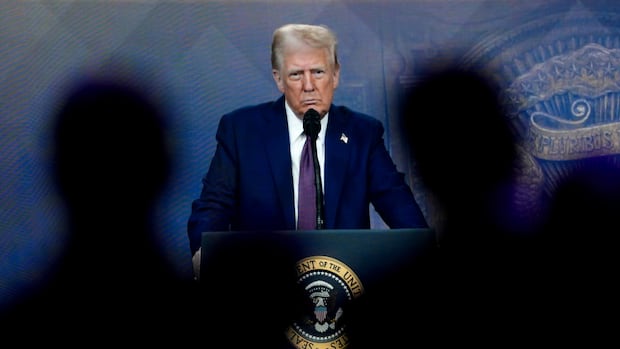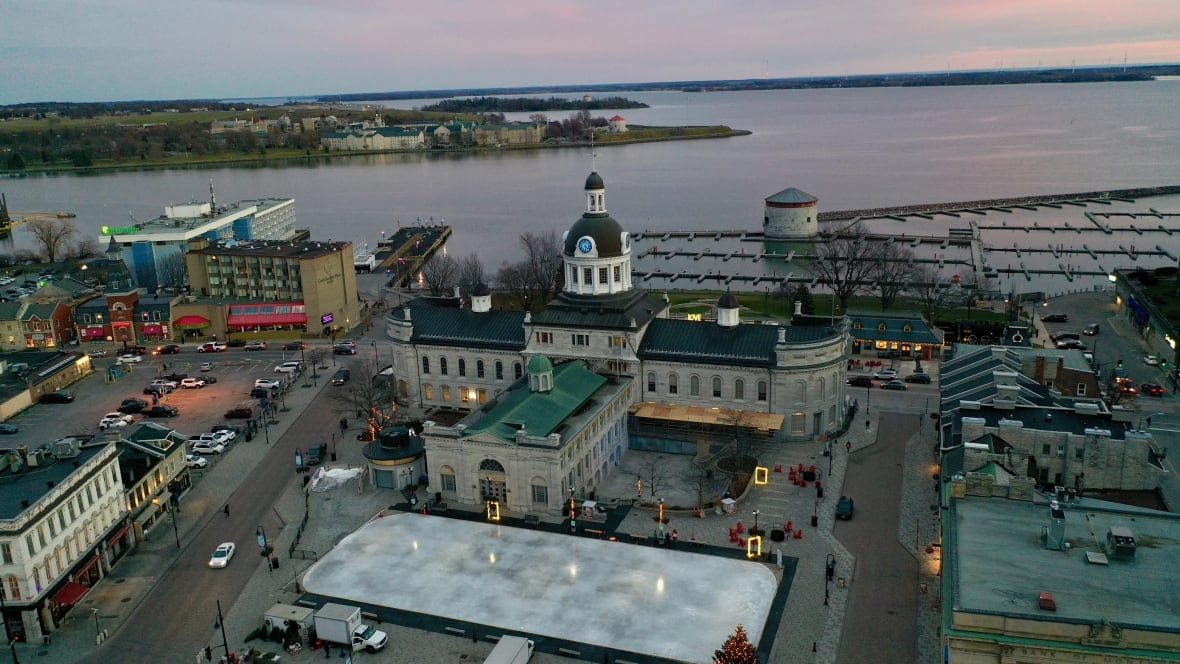As Ottawa promises to retaliate against American trade tariffs, U.S. President Donald Trump has taken a new swipe at Canada.
Trump says the United States does not need oil, gas, vehicles, or lumber imports from his allies to the north.
Trump made the comments Thursday, in his first speech to world leaders since returning to the White House for his second term.
During his virtual address at the World Economic Forum, in Davos, Switzerland, Trump was unwavering on his threat of tariffs while sharing harsh criticisms for Canada.
‘Tough to deal with’
“Canada’s been very tough to deal with over the years and it’s not fair that we should have a $200 billion or $250 billion deficit,” Trump said.
“We don’t need them to make our cars. And they make a lot of them. We don’t need their lumber, because we have our own forests.
“We don’t need their oil and gas. We have more than anybody.”
U.S. President Donald Trump, speaking by video to people gathered at the World Economic Forum in Davos, Switzerland, argued that other countries, including Canada, are taking advantage of the U.S. He also repeated claims that the U.S. doesn’t need anything from Canada.
The remarks were the first of Trump’s four-day-old presidency to global business and political leaders at a time when global markets and Canadian political leaders remain on edge over his plans for sweeping trade penalties on all imported goods.
Trump characterized the trade relationship between the two nations as adversarial and unfair and blamed Canada’s import policies for the U.S.’s trade goods deficit.
During his address from the White House, Trump mused over his increasingly protectionist plans for the United States, suggesting that Canada has unfairly profited from its trade relations with the US.
“We’re going to be demanding respect from other nations,” Trump said.
“We have a tremendous deficit with Canada. We’re not going to have that anywhere. We can’t do it.”
Trump listed the rapid-fire changes he had made since his swearing-in on Monday and promised to reduce inflation with a mix of tariffs, deregulation and tax cuts. He said producers must manufacture their goods in the U.S. or face tariffs.
Trump’s comments triggered widespread criticism among political leaders north of the border, many of whom remain divided over how best to defend against the threat of sweeping trade duties.
Alberta responds
In Alberta, Premier Danielle Smith has advocated for diplomacy over the threat of retaliation.
Smith is returning from a five-day mission to Washington D.C., and a personal meeting with Trump at his home in Florida.
A statement from Smith’s office reiterated that the premier believes Alberta’s energy sector holds the key in ongoing negotiations, that cross-border trade within the oil and gas sectors is critical in “advancing North American energy dominance.”
A statement from her press secretary says Smith, who was on a flight home to Alberta on Thursday, has not wavered in her stance that diplomacy is the best defence.
“A U.S. tariff will hurt American and Canadian consumers, and we should be focused on developing our trade relationship through diplomacy, not threats,” the statement reads.
“In a negotiation, both sides will say all kinds of things and use different tactics. It’s important when this happens to remain calm and diplomatic while continuing to carry out Alberta’s and Canada’s strategy. The Premier will continue to do so.”
Jason Kenney, Alberta’s former premier, took issue with Trump’s remarks on closing the border to oil and gas exports, describing them as “peculiar.”
In an interview Thursday, Kenney said the United States relies heavily on energy exports from Canada and Trump has previously touted the approval of major cross-border energy projects.
Most recently Trump called for the revival of the now-defunct Keystone XL pipeline that would have carried oil from Alberta to the U.S. Midwest.
“Just to focus on how peculiar these remarks are, one-fifth of the energy — the oil consumed — in the United States comes from Canada. So, actually the United States does need that,” Kenney said.
“And, as others have pointed out, Canada sells that energy to the United States at a fairly steep discount.”
Keeping our cards close
Kenney said it’s regrettable that Trump remains “obsessed” with aiming at a traditional trade ally and introducing policies that would be harmful to American consumers. The president’s strategy “simply doesn’t add up,” Kenney said.
“A key line in the [Trump] inaugural speech was to ‘drill, baby drill’ to increase American energy supply,” Kenney said.
“Well, they’re gonna have to do a lot of drilling to replace the four million barrels a day that comes from Canada.”
Kenney said Canada should not rule out retaliatory measures against Trump’s new tariffs but urged federal and provincial leaders this side of the border to remain tactful as talks continue.
“We should be strong, united, and have a certain calculated ambiguity,” Kenney said.
“We shouldn’t be playing all of our cards transparently.”
#Trump #U.S #doesnt #Canadas #oil #gas #vehicle #lumber #imports










Leave a Reply